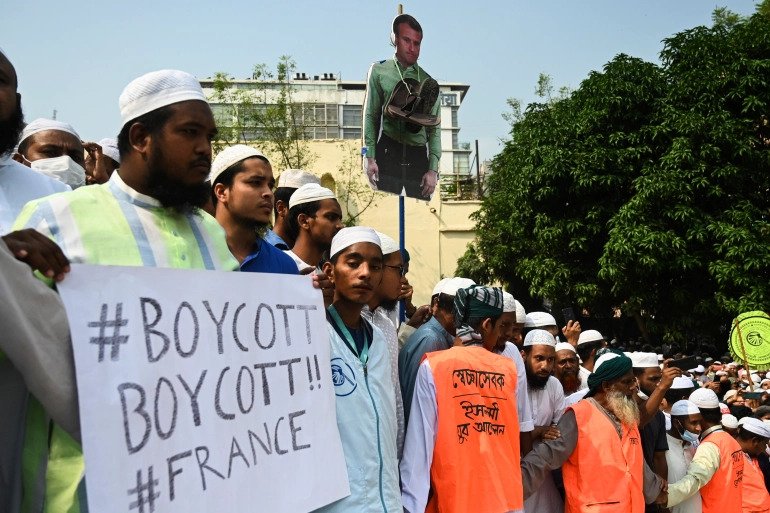Knife attack in French city Nice leaves three dead
Assault carried out at a church in Nice comes weeks after teacher Samuel Paty was killed near Paris.
An attacker with a knife killed at least three people at a church in the French city of Nice on Thursday, officials said, in an incident the city’s mayor described as “terrorism”.
Mayor Christian Estrosi, a former MP with the right-wing Republicans party, said on Twitter that police had detained the attacker after shooting him.
Estrosi tweeted: “I can confirm everything suggests this was a terror attack in the Notre-Dame Basilica,” in central Nice.
He claimed that two women and one man were dead. One woman took refuge in a nearby bar where she succumbed to her injuries. The other was killed in the most “horrible” way, he said, “like the professor” – an apparent reference to the recent attack on French teacher Samuel Paty, who was beheaded in broad daylight.
Later, in a separate development, police killed a suspect in the southern French city Avignon who they said had threatened passersby with a handgun.
In a third development on Thursday, amid growing tensions between France and the Muslim world, Saudi state-run media said a man was detained after he stabbed and slightly wounded guard at the French Consulate in Jeddah.
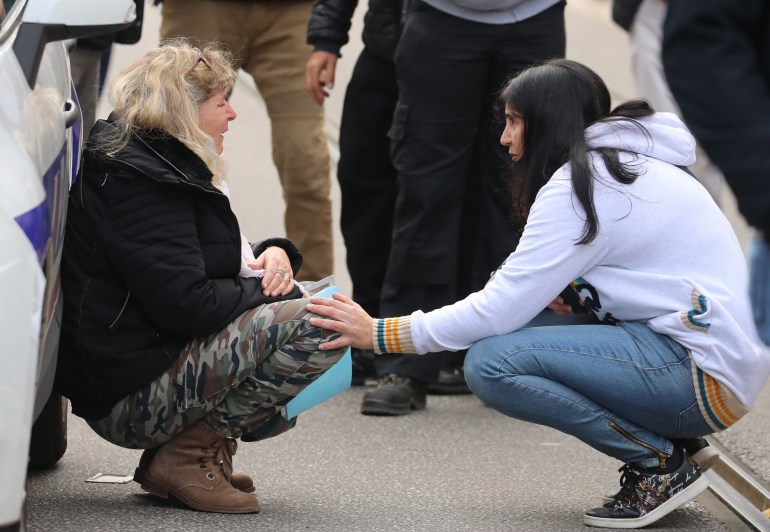
President Emmanuel Macron was heading to the city, while Interior Minister Gerald Darmanin held a crisis meeting as he warned people to avoid the site of the attack.
A representative of the French Council for the Muslim Faith condemned the attack. “As a sign of mourning and solidarity with the victims and their loved ones, I call on all Muslims in France to cancel all the celebrations of the holiday of Mawlid,” the spokesman said.
The holiday is the birthday of the Prophet Mohammad, which is being celebrated Thursday.
Officials across the political spectrum offered their sympathies.
Jean-Luc Melenchon, leader of the left-wing France Insoumise party, tweeted: “Thoughts of compassion for the victims of the attack in #Nice.”
Anne Hidalgo, the left-wing mayor of Paris, said: “My first thoughts go to the victims and their loved ones affected by this horrible attack. The people of Nice, as well as it’s mayor @cestrosi, can count on support from the city of Paris.”
But Marine Le Pen, a leading far-right figure, adopted a provocative tone, calling for the “eradication of Islamism from our soil”.
The anti-terrorism prosecutor’s office said an investigation had been opened into an attack with a terrorist connection.
Meanwhile, the lower house of parliament suspended a debate on new coronavirus restrictions – the country will go into a fresh lockdown on Friday, and held a moment of silence for the victims.

Thursday’s attack comes while France is still reeling from the killing of Paty, by a man of Chechen origin.
The attacker had said he wanted to punish Paty for showing pupils caricatures of the Prophet Muhammad in a civics lesson.
In a comment on recent beheadings in France, the Kremlin said on Thursday it was unacceptable to kill people, but also wrong to insult the feelings of religious believers.

It was not immediately clear what the motive was for the Nice attack, or if there was any connection to the cartoons, which Muslims consider deeply offensive.
Since Paty’s killing, French officials – backed by many citizens – have re-asserted the right to display the cartoons, and the images have been widely displayed at marches in solidarity with the slain teacher.
That has prompted an outpouring of anger in parts of the Muslim world, with some governments accusing French leader Emmanuel Macron of pursuing an anti-Islam agenda. Muslims deeply revere the Prophet and find the caricatures, which often link Islam to “terrorism”, offensive.
Man Arrested in Jeddah After Stabbing a Guard at French Consulate
A man was arrested in Jeddah, Saudi Arabia, after stabbing a guard at the French consulate, state media have reported.

According to Sky News Arabia, the guard was injured with a sharp object. He was hospitalised and his life is not in danger, the French Embassy said.
The suspected attacker is a Saudi citizen, he was detained by police, the embassy added. “The assailant was apprehended by Saudi security forces immediately after the attack. The guard was taken to hospital and his life is not in danger,” a statement by the embassy reads.
The French consulate in Jeddah has issued a statement condemning the attack.
The incident comes just a couple of hours after three people were killed and several others injured by a knifeman in Nice, France. According to the mayor of Nice, Christian Estrosi, the perpetrator shouted ‘Allahu Akbar’. The incident could qualify as a possible terrorist attack, Estrosi added. In another incident, also on Thursday, a knife-wielding man attempted to attack police officers in Avignon.
On 16 October, a radicalised 18-year-old man of Chechen origin beheaded French teacher Samuel Paty, after he had shown his pupils cartoons featuring the Islamic prophet Muhammad. For Muslims, any image of the prophet is considered blasphemous.
French President Emmanuel Macron described the attack against Paty as a terrorist act and described Islam as “a religion in crisis”. His statements provoked strong criticism from Turkish President Recep Tayyip Erdogan, who called for a boycott of French goods.
Thousands rally in Bangladesh calling for boycott of French goods
Tens of thousands march in Dhaka, burning effigy of French President Emmanuel Macron for defending Prophet Muhammad’s caricatures.
Tens of thousands of protesters have marched through the Bangladesh capital, calling for a boycott of French products as anger over President Emmanuel Macron’s defence of cartoons depicting Prophet Muhammad mounts in the Muslim world.
The protesters on Tuesday burned an effigy of Macron during their march in Dhaka, chanting: “Boycott French products” and calling for the French leader to be punished over his alleged Islamophobia.
Police estimated that more than 40,000 people took part in the march organised by Islami Andolan Bangladesh (IAB) party.

Macron has sparked outrage across the Muslim world by accusing Muslims of “separatism” and describing Islam as a “a religion in crisis all over the world”.
The French leader also announced a plan “to reform Islam” in order to make the country’s six million Muslims more compatible with France’s republican values.
Tensions further escalated in the aftermath of the killing of Samuel Paty, a middle school teacher who showed his pupils drawings of Prophet Muhammad during a discussion on the freedom of speech.
As Macron slammed Paty’s killing, he also defended the prophet’s caricatures.
Since then, the backlash over Macron’s remarks has grown, with calls for expulsion of the French envoy from several Muslim-majority countries and a boycott of French goods.

“Macron is one of the few leaders who worship Satan,” Ataur Rahman, a senior IAB leader told the rally at the Baitul Mukarram national mosque, from where the march began.
Rahman called on the Bangladesh government to “kick out” the French ambassador while another leader, Hasan Jamal, said activists would “tear down every brick of that building” if the envoy was not ordered out. “France is the enemy of Muslims. Those who represent them are also our enemies,” said Nesar Uddin, a young leader of the party.
The march was halted before it could get close to the French embassy in Dhaka.
Hundreds of officers used a barbed-wire barricade to stop the protesters, who were marching peacefully.

The march was halted before it could get close to the French embassy in Dhaka.
THE BACKGROUND STORY
Suspect dead, 11 in custody following beheading of teacher in Paris suburb
Eleven people are in custody after police in a Paris suburb shot to death a man seen carrying a knife that authorities believe may have been used to kill another man found nearby.
The shooting of the suspect, 18, occurred around 4 p.m. local time on Friday in the town of Eragny in the Val d’Oise. France’s Anti-Terror Prosecutor’s Office confirmed to ABC News that it has opened an investigation into whether the killing is linked to terrorism.
The victim was beheaded, authorities said. He was a male teacher at a local middle school who had received threats after mentioning the controversial Charlie Hebdo cartoons depicting the Prophet Mohammed during a lesson, according to police. The lesson prompted a complaint from one of the parents.
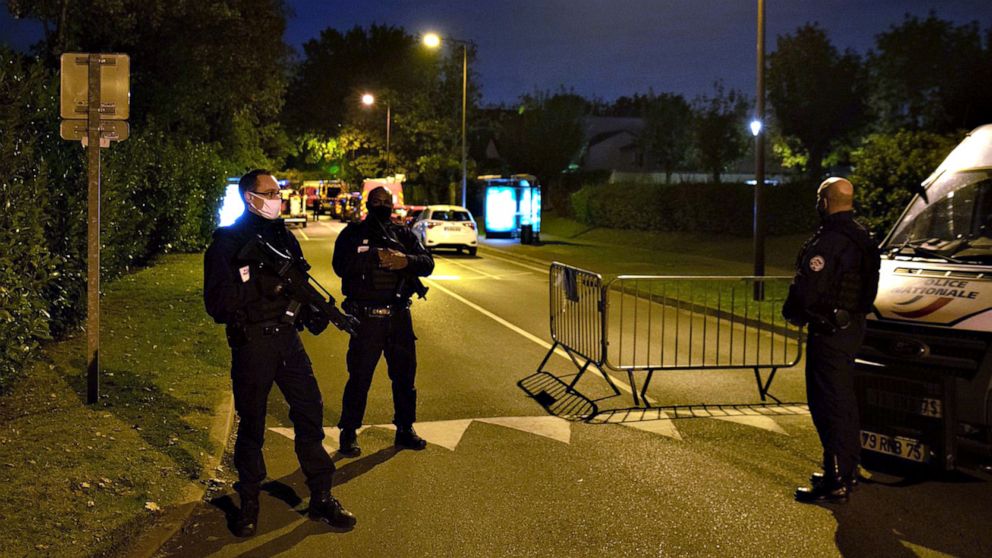
Speaking Friday night from the middle school, French President Emmanuel Macron said the teacher was the victim of a “blatant Islamist terrorist attack.”
“One of our fellow citizens … was murdered today for teaching, for teaching students freedom of speech, freedom to believe and not to believe,” he said. “It is no coincidence that this evening it is a teacher that this terrorist killed because he wanted to bring down the Republic in its values.”
The victim was identified by authorities as Samuel Paty, 47, a professor of history and geography at the middle school, College du Bois d’Aulne.
The suspect had asked students in front of the school to help him identify the victim, according to authorities. Paty was attacked in the immediate vicinity of the school while on his way home and also had multiple wounds on his head, in the abdomen and upper limbs, authorities said. A bloodied knife was discovered a few meters from the scene of the crime, police said.
The national police responded shortly after 4 p.m. local time on Friday following the discovery of a body, authorities said. The suspect was seen running toward the police officers, firing what looked like a pistol five times, which turned out to be a toy air gun, authorities said. Three officers fired back, causing the suspect to fall, police said. While trying to get up, the suspect attempted to stab the officers who neutralized him, authorities said. The suspect was hit by nine bullets, anti-terrorism state prosecutor Jean-François Ricard said during a press briefing Saturday.
The suspect was identified by authorities as a Moscow-born Chechen refugee who had a French residence permit. He was unknown to intelligence services, authorities said.
The teen claimed responsibility for the attack on Twitter in a post that referred to the victim by name and included a macabre photo of him, Ricard said. “I executed one of your hellhounds who dared to belittle Muhammad,” part of the post said, according to authorities. The account has since been suspended.
Eleven people are in police custody, including four members of the suspect’s family, authorities said. The student’s father who complained about the teacher’s lesson and a second man who came with him to the middle school are in custody. The second man’s partner was also taken in for questioning. Two people who came forward and indicated that they had been in contact with the perpetrator shortly before the events are also in custody. Police are investigating to establish the involvement of those in custody, authorities said.
Macron promised a swift response from the government on Friday. “They will not divide us,” he said. “This is what they are looking for and we must all stand together, citizens.”
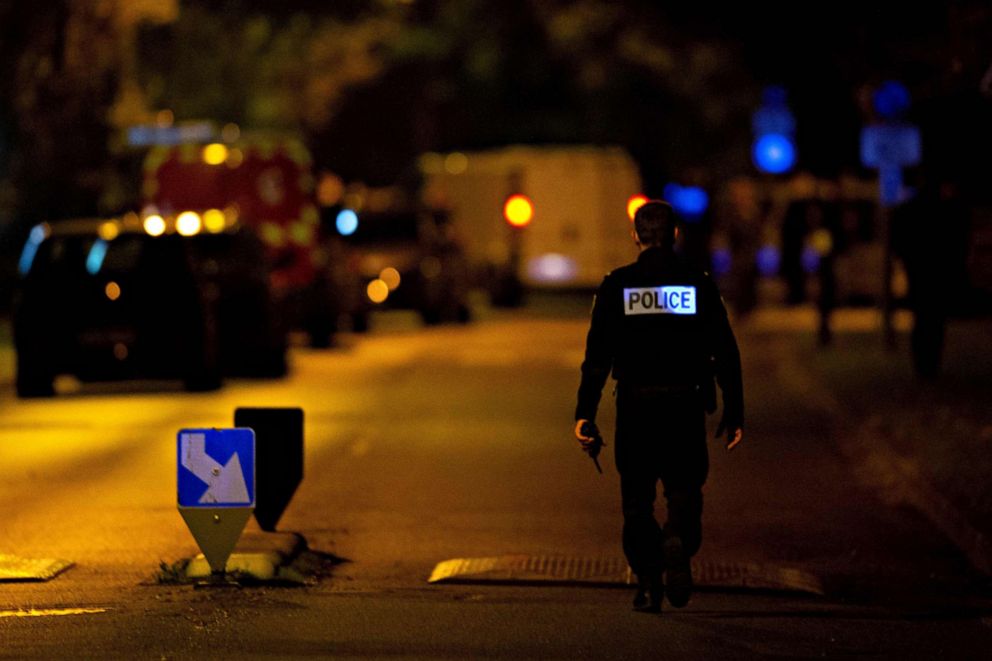
Minister of National Education Jean-Michel Blanquer reacted to the incident on Twitter Friday night. “Tonight, it is the Republic that is under attack with the vile assassination of one of its servants, a professor,” he said. “I think tonight of him, of his family. Our unity and firmness are the only answers to the monstrosity of Islamist terrorism. We will stand up.”
Blanquer announced Saturday that there will be a national tribute to the teacher, including a minute of silence. “Samuel Paty embodied the Republic in its most noble form: its school,” Blanquer said.
Eragny Mayor Thibault Humbert responded in an interview on local TV BFMTV Friday night. “It is a very important emotion for us, for the inhabitants of our town,” he said. “I want to have a thought for the family of this professor who was brutally murdered.”
The offices of Charlie Hebdo underwent a terror attack in January 2015 that killed 12 people, including eight journalists from the satirical magazine. The trial for the attack is currently underway.
France’s counterterror police opened an investigation after a stabbing attack in front of the former offices of Charlie Hebdo last month left two wounded.
Ricard acknowledged that prior incident on Saturday, saying, “This terrorist crime is the second committed during the trial of the January [2015] attacks. … This confirms the very high level of the Islamist terrorist threat that we have to face.”
Charlie Hebdo expressed “horror and revolt” over the death of the teacher in a statement released on Twitter Friday: “We express our deepest support to his family, loved ones and all of the teachers. … This foul act grieves our democracy but must make us more combative than ever to defend our Freedom.”
Anger at beheading of French teacher ‘must not override rule of law’
An escalating crackdown on groups suspected of aiding or abetting Islamist extremists has prompted accusations that the French government is riding roughshood over legal protections in the wake of the gruesome murder of 47-year-old teacher Samuel Paty last week.

President Emmanuel Macron has promised to intensify a clampdown on Islamist radicalism in France, days after Paty was murdered in broad daylight in a quiet Paris suburb for having shown and discussed caricatures of the Prophet Mohammad in a civics class. “Fear must change sides,” Macron told ministers as he chaired an emergency cabinet meeting on Sunday. “The enemies of the Republic cannot expect a minute’s respite,” added his hardline interior minister, Gérald Darmanin.
French police have raided dozens of Islamist groups and suspected extremists since Friday’s attack. The vast majority of raids were not related to the investigation into Paty’s murder, officials said, but part of a strategy to “harass and destabilise” groups suspected of promoting anti-Republican hate speech.
In a rare move, Darmanin has ordered the six-month closure of a mosque in a northeastern suburb of Paris that posted the parent’s message on its Facebook page. He also called for a number of Muslim groups to be dissolved.
They include the Cheikh Yassine Collective, a pro-Hamas outfit named after the Palestinian group’s late founder, that Macron said were “directly implicated” in the teacher’s murder. The group’s founder, radical Islamist Abdelhakim Sefrioui, is being held by police for publishing a video on YouTube insulting Paty.
More controversially, Darmanin called for the dissolution of the Anti-Islamophobia Collective (CCIF), a prominent watchdog that monitors discriminatory attacks on Muslims. The CCIF was “manifestly implicated” in the chain of events leading up to Paty’s death, the minister claimed, without offering evidence.
‘Madness’
Lawyers and analysts have questioned the timing of the clampdown, which comes as the government is under pressure to respond forcefully to an attack that has shocked the nation to the core. “If these groups and mosques constituted a threat to public order, why were they not shut earlier?” asked Paris-based lawyer Thierry Vallat in an interview with FRANCE 24. He said the government’s timing exposed it to accusations of political opportunism, “and could easily be exploited in court by the groups it is targeting”.
That is, indeed, the line of attack adopted by one of the groups targeted by Darmanin, the humanitarian association BarakaCity, which denounced the government crackdown in a Facebook post on Monday. “Madness has seized the interior minister who, because he cannot find anything against our NGO, has taken advantage of the emotion caused by the tragedy,” the group said in a statement.
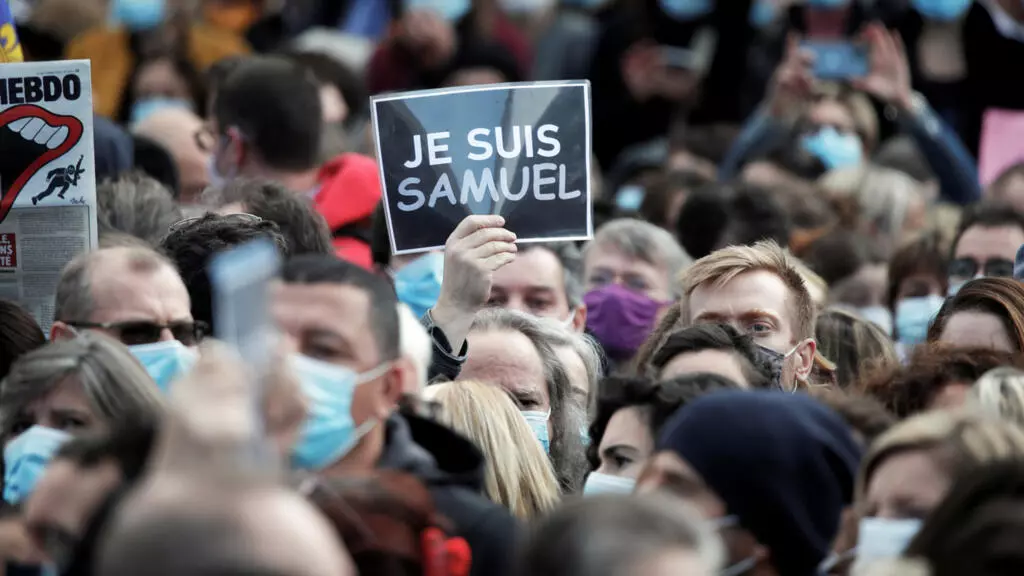
Denouncing a self-serving PR campaign by the government, William Bourdon, a lawyer for BarakaCity, noted that the group had already been cleared of charges after a previous French administration had accused it of channelling humanitarian funds to terrorist groups. “I’m extremely concerned to see the government rushing headlong into accusations, thereby trampling on a number of cherished principles that underpin our democracy and the rule of law,” Bourdon told local radio station France Info.
‘Two-headed hydra’
Legal experts have also questioned the feasibility of the clampdown, noting that the government will have to provide hard evidence in court to back its claims that such groups constitute a threat.
Enshrined in a 1901 law, “freedom of association” is a cornerstone of French democracy. To justify dissolving an association, the government must prove that it constitutes a threat to public order, that it preaches hatred of individuals or communities, or that it has failed to rein in individual members guilty of the above.
According to Franck Frégosi, a professor at Sciences-Po Aix and a specialist on Islam in France, Darmanin will have a hard time incriminating BarakaCity and the CCIF on ideological grounds. While both defend “a sometimes rigid version of Islam, they are also prudent and mindful of the law”, Frégosi told AFP. He added: “As far as I know, neither has called for murder, revenge or toppling the Republic.”
The government is yet to publish its decrees banning the associations; only once they are made public will the strength of the government’s case become clear, said Vallat. “Tangible proof could mean individuals ‘retweeting’ the fatwas aimed at the professor or ‘liking’ hateful posts,” he said. “Such elements, gathered on social media, could be used as evidence of activities that infringe on the values of the Republic.”
Describing French administration as a “steamroller”, Vallat suggested there was a reasonable chance the government would succeed in striking down one or more of the groups it has targeted. However, it is almost certain they would eventually reappear under a new label, he cautioned. “They’re like two-headed hydras: if you cut off one head, a similar one will soon emerge under a new name,” he said. “It is much easier to do away with a name than it is to root out a hateful ideology.”
Above the law
Dounia Bouzar, an anthropologist and expert on radicalisation, said recent efforts to ban violent far-right groups, such as the neo-fascist Social Bastion, had shown how difficult and frustrating it is to combat extremist outfits. “When the effort [to dissolve a group] succeeds, alternative groups soon spring up. And when the effort fails, the group emerges strengthened,” she told FRANCE 24.
In the case of the CCIF, Bouzar stressed the troubling message the government is sending by eliminating a high-profile group whose primary mission is to combat discrimination – at a time when many French Muslims already feel marginalised.
She also questioned the legal grounds of the government’s offensive. “We know the ideology of many members [of the CCIF], who are close to the Muslim Brotherhood. But under French law, they have every right to hold such beliefs,” she said. “If France tries to curb such rights, it would soon be at odds with European law,” Bouzar added, noting that the European Court of Human Rights closely monitors the religious freedoms of individuals in EU member states. “In its choice of rhetoric, the French government sometimes appears to place itself above the law,” Bouzar lamented. “The law must be enforced, without waiting for such horrific attacks to happen. But at the same time, we must not let an emotional response override the rule of law.”
SOURCE: all original sources in each clickable link



